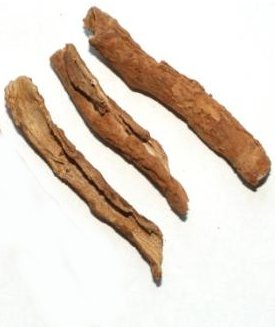Di Gu Pi

  | Di Gu Pi in TCM:Explore the properties of Di Gu Pi according to Chinese
Nutrition and Traditional Chinese Medicine (TCM):
Factoids:
English Name: lycium root bark, barbary wolfberry, root bark, Chinese wolfberry root bark
Pharmacuetical Name: Cortex Lycii
Properties: sweet, bland, cold
Temperature: cold
Channels: LU, KD, LV
Flavors: sweet
Special Properties:
circulates blood, clears heat, clears deficent heat
Actions / Indications:
- Clears deficient heat (steaming bone disorder with
sweating, night sweats, chronic low grade fever, irritability, thirst;
drains floating fire in the KD channel, treats toothache from deficiency
fire)
- Clears LU heat; stops cough (cough or wheeze, excessive
constrained heat in LU)
- Clears heat; cools blood (hematemesis, epistaxis,
hematuria due to reckless movement of blood)
Special Notes:
- Similar to Sang Bai Pi, but Sang Bai
Pi clears heat from the qi level whereas Di Gu Pi clears heat from the
blood level.
- Pharmacologically, Di Gu Pi has been shown to act as an antibiotic, antihypertensive, antipyretic, and antidiabetic.
Contraindications:
- (cc: SP and ST cold from deficiency with loose stool)
- (cc: exterior disorders)
Disclaimer: In accordance with our terms of service, by using this web site you agree that none of the information found on this web site constitutes medical advice. You should always consult your doctor before trying any particular food or herbal remedy to treat disease.
Folk remedies presented on this site are designed to address specifc TCM diagnoses, and are not one-size-fits-all. If you would like to learn more about Traditional Chinese Medicine (TCM) and how it relates to Chinese Nutrition, you can book in a free call with a licensed professional. There is no obligation to purchase.
[CLICK HERE for your free INITIAL CONSULTATION] |

